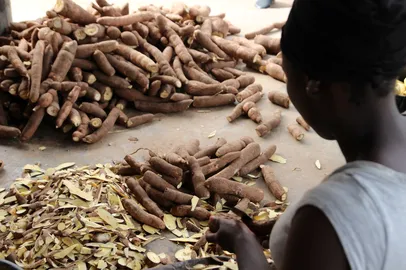Biomass use is trend-setting for Africa
October 08, 2020.
More than 227 million people in sub-Saharan Africa were severely undernourished and malnourished in 2019 (State of the World Food Insecurity). A major cause of hunger and malnutrition in these countries is the lack of access to (high-quality) food.
Scientists at the University of Bonn and their international colleagues have investigated the role that the use of biomass (all biologically produced materials), can play in the fight against hunger and the promotion of development.
Their research results have been published in an anthology "Food and Non-Food Biomass Production, Processing and Use in Sub-Saharan Africa: Towards a Regional Bioeconomy" (see https://www.mdpi.com/2071-1050/12/5/2013). The volume contains 23 scientific contributions highlighting the possibilities of an integral use of biomass.
Most of the published research was conducted within the German-African cooperation project "BiomassWeb", funded under the initiative Global Food Security (GlobE) of the German Federal Ministries of Research and Education (BMBF) and Economic Cooperation and Development (BMZ) 2013-2018. The project was carried out in Ghana, Nigeria and Ethiopia and focused on the value chains of maize, cassava and banana/cooking banana/seed as well as biomass from agroforestry systems and natural vegetation. The BiomassWeb researchers suggest an integral use of biomass, so agriculture products and byproducts can be used in several instances and recycled rather than thrown away. For instance, concepts for the extensive use of manioc are presented, whereby the shelf life of the fresh root is increased and a cost-effective method for the extraction of manioc starch powder is developed, as well as new foods or food additives are extracted and edible mushrooms are produced on manioc waste.
Bioeconomy, is defined as the “... knowledge-based production and use of biological resources to provide products, processes and services in all economic sectors within the frame of a sustainable economic system.” (Bioeconomy Council 2018). In this setting, the findings of the BiomassWeb project summarized in this book make facets and possibilities of the bioeconomy in Africa visible. So far, only a few national or regional strategies have been developed in Africa to use the continent's immense biomass production potential in a targeted and sustainable way. This book intends to contribute to developing new bioeconomy strategies in Africa.
Since poverty is one of the main causes of hunger, income plays a decisive role in combating food insecurity. In rural regions in particular, it is important to create jobs for young people, especially girls and women. Income opportunities and jobs can be created by making innovative use of biomass from agriculture and forestry, as well as by recycling and reusing it, and by replacing fossil fuels with renewable raw materials within the framework of a bioeconomy.
Reference: Bioeconomy Council. Global Bioeconomy Summit 2018. Conference Report. Federal Ministry for Education and Research: Bonn, Germany, 2018. www.gbs2018.com.
Publication at https://www.mdpi.com/2071-1050/12/5/2013



